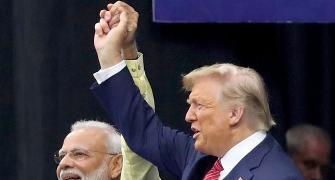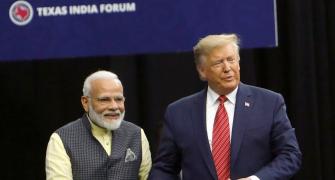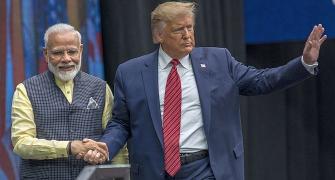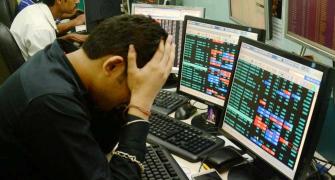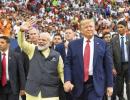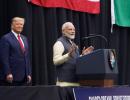‘If there was any restraint in praising Prime Minister Modi’s US trip, it was only for fear of being labelled a “Sanghi.”
‘Many who came to scorn, knelt to pray.
‘If the UN is New York’s talking shop, he made it into Harrod’s, London,’ says Ambassador TPS Sreenivasan.
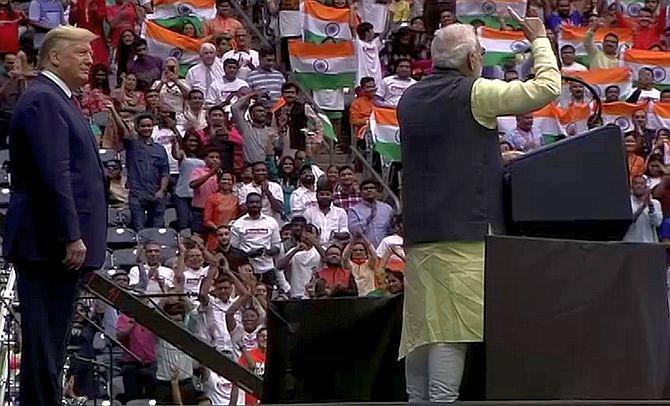
In today’s India, divided as it is between pro-Modi and anti-Modi populations, it is difficult to take a balanced view of anything good or bad.
Such polarisation is unprecedented as democracy demands that the elected government should be supported for the good it does and be opposed if anything bad happens.
Modi cannot do anything good in some eyes and he cannot do anything bad in some other eyes.
It does not seem to matter how many seats he has in the Parliament or on what platform he has won the election.
Normally, when a prime minister goes abroad, he goes with the blessings of all and if it is a difficult visit, everyone will chip in with ideas to help him and watch his actions with sympathy and understanding.
If one thing or the other has not been accomplished, a clear analysis is made of the reasons and corrective action is taken.
Many good things happened during his American sojourn and despite wide acclaim by the media, the opposition intelligentsia is silent at best.
The Howdy Modi event in Houston was the most significant of all, but opinion on it was divided even before it started.
As it grew into the biggest rally in history for a visiting Indian PM, questions began to be asked about the expenses even after it was clarified that it was a community effort.
When US President Donald Trump agreed to come to the event, no credit was given to Modi for swinging it with his own equation with Trump. It is the election, stupid, was the reaction of the Modi haters.
Even if it is the election, if the US president thinks that the Indian PM will be able to get the Indian Americans to vote for him, it should be a matter of pride for India, not just to the Bharatiya Janata Party.
Hyperbole and flattery are instruments of diplomacy in certain circumstances, like the present one when Modi was trying to turn the indifference and hostility of three years of Trump into a partnership.
He could be more restrained and dignified, but Trump liked it and he called Modi ‘Father of India’ and ‘Elvis Presley’.
Whether such mutual admiration could be generated by other means is unknown. The medicine has to match the disease for the patient to be healed.
Why should Modi seem to be campaigning for Trump is the other big question. He merely parodied his own slogan for his own government to keep Trump in good humour without saying a word about Trump’s suitability or otherwise for another term.
In these over-sensitive times, he could have avoided it. During the last elections, Modi did not make even a courtesy call on candidate Trump. He was backing Hillary Clinton.
Modi used a clever device to say India is doing well, not to mislead the world into thinking that there were no problems in India. His logic was that he alone should not respond to the greeting ‘Howdy’ as it is addressed to the whole of India.
When a question like “How do you do?” is asked as part of a greeting, the proper response is “We are fine” Nobody recounts his woes in response to such a question.
Nobody will say my wife is sick, the children are out of school and there is a depression etc.
He said we are well in different Indian languages to emphasise the diversity and to remove the language controversy ignited by one of his colleagues.
In these days of fast communication everyone knows what the state of India is and no assertion about wellness will deceive anyone. Diplomats cannot “lie abroad” anymore.
Did Modi stoop before Trump to conquer something?
Remember the basket of problems Secretary of State Pompeo brought to Delhi? Russian missiles, Iranian oil, Kashmir, trade, terrorism and religious intolerance. Modi told him that we would do whatever was necessary in our national interests, regardless of American views.
In Houston and New York, many of these issues came close to solutions, though final solutions were not found.
Trade imbalance, which was the biggest issue for Trump, seemed to be on its way to resolution when Trump himself announced that India would buy natural gas and defence equipment from the US.
Though the trade deal could not be announced either in Houston or New York, there were sufficient indications that things were moving fast in that direction.
From our perspective, dissuading Trump from mediation on Kashmir was crucial. Trump finally said in New York that he would mediate only if both sides request him to do so.
This is a formula that the secretary general of the UN had also adopted. Trump continues to believe that mediation is the answer, but he accepted the Indian position grudgingly.
On terrorism, Trump was quite forthright about elimination of radical Islamic terrorism. What is more, he added that it was the right of India and the US to protect their borders against any kind of transgression.
He said he knew that India had the capacity to combat Pakistani terrorism, legitimising any method India used including surgical strikes across the border.
Of prime importance to the Indian community in the US is Trump’s migration policy. Much to their relief, Trump made a clear distinction between Indian Americans and the illegal immigrants from Latin America.
He said the US was proud of its Indian Americans and was ready to fight for them, he said. The Houston audience heaved a collective sigh of relief.
Even the worst critics of Modi are likely to judge his performance at the UN impeccable. His immaculate address to the GA broke all records of brevity and made Indian foreign policy for the common good of mankind.
He echoed Pandit Nehru’s words that India had its dreams, but they were also the dreams of the world.
Similarly, every speech he made on occasions like the Gandhi Solar Park Inaugural, the Climate Summit, the terrorism debate and the Gates Award, he was eloquent, but restrained, proud but modest and politically correct.
If there was any restraint in praising him, it was only for fear of being labelled a “Sanghi.”
Many who came to scorn, knelt to pray.
If the UN is New York’s talking shop, he made it into Harrod’s, London.
Modi has done India proud.
- You can read more columns by Ambassador T P Sreenivasan here.
T P Sreenivasan, (IFS 1967), former Ambassador of India and Governor for India of the IAEA is the Chairman, Academic Council and Director, NSS Academy of Civil Services, Director General, Kerala International Centre.

